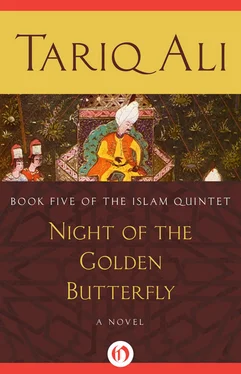In fact, I said, it was a matter of some regret to me that Jindié wasn’t a few years older since I preferred mature women. Unable to respond, she moved forward to assault me once again, but I stepped aside at the last minute and she fell on my bed instead. The next morning she radiated a surface calm, but was still seething. She was sometimes capable of manufacturing the most fantastic untruths, but also specialized in trivial fibs, and was usually caught out because of her inconsistencies. She could never remember what she had said to the same person some weeks previously. As I tucked into my scrambled eggs, I smiled at her to show there was no ill will on my part. She took this as a cue for hypocrisy and a malapropism, another feature of her dialect.
‘I know what you’re thinking. You think I’m opposed to her because her father has been measuring our feet for donkey’s ears.’
I began to laugh. ‘No, mother. He has been measuring donkey’s feet for my father’s and grandfather’s ears.’
She hurled a boiled egg at me, which missed. At this point I decided it was best to go out for a long walk. As fate would have it, I found myself walking unconsciously in the direction of Nairn College, and just before I reached the gate a car honked at me. It was a cousin. We exchanged greetings. The chauffeur got out and held open the back door. I got in. We drove into the college car park.
‘Dara, have you come to see Jindié?’
‘Well, I wasn’t planning to, but… yes!’
‘She may have left. I’ll go and see, but if you’re caught, Miss Willoughby-Ashleymore will ring all our parents.’
‘Nothing she can do to me.’
‘Dara, at least cover your head with a shawl so they’ll think you’re a woman.’
‘What about my moustache? Oh, I forgot. Miss Willoughby-Ashleymore sports one as well. I’m happy to put on a disguise. Bring back a bra and some socks.’
She giggled and walked hurriedly to the girl’s hostel, a veritable harem where we were denied entry, but where mischief of every sort flourished. Within ten minutes she was back with the required items. I was wearing a salwar/kurta and hurriedly assembled a pair of breasts, much to the chauffeur’s amusement, covered my head and half my face with a shawl, put on a slight limp and accompanied my ever-so-sporting cousin to a friend’s room, where Jindié was waiting. She giggled.
‘A bit of eye makeup and you’d be a perfect hermaphrodite!’
The friends scarpered. The minute we were alone I ditched the bra and socks. We fell chastely into each other’s arms. I managed to imprint a tiny kiss on her lips. Believe me, dear reader, it was purely token. Our lips barely touched, but it startled her. She sat bolt upright and rapped me on the knuckles with a fly swat.
‘Why do you always make me angry? I’ll never see you alone unless you promise to behave.’
‘Have you read the Thousand and One Nights , Jindié?’
She pushed me away. Wanting desperately to amuse her, I described the conversation with my mother. She instantly became melancholic.
‘I warned you not to tell her.’
‘She ransacked my desk and bookshelves, then forced open the secret drawer in my cupboard and found my diary.’
‘Why did you keep a diary? So immature.’
‘Fantasies have to be recorded somewhere.’
She wanted to know what I had written. I provided a brief summary. She covered her face with her hands.
‘You wrote that we spent all night talking?’
‘On the phone! I did. It’s true.’
‘I know, but it creates a bad impression.’
‘Who cares?’
She became silent. Then she said, ‘Go. Let me think about all this now. And don’t ring me from home. Go to the German café.’
Our guards were outside, waiting patiently and eavesdropping. They entered the room promptly. Slightly depressed, I resumed my disguise and walked out, moving my buttocks suggestively. As we walked past the tree to which was attached the Nairn College bell — that evil tocsin which summoned the women to class and assemblies and signalled that visitors should leave — I took out my penknife and detached the bell from the rope. My escorts, three of them cousins of mine, were horror-struck.
‘Hai Allah, Allah. We’ll all be expelled. You monster. You’re never coming here again. Rude boy. Evil one. Viper!’ And so on. I rushed to the car, clutching the bell to my stomach, and was driven away. Miss Willoughby-Ashleymore, I was later told, instituted a full-scale investigation and even summoned a senior police officer whose daughter was at the college, to frighten the students, but the mystery was never solved. The memento, rusty and worn like the college to which it once belonged, still hangs from the mango tree in my mother’s old garden, where it was often used by the gardener to frighten away the parrots. The following week Jindié and I met at the German café, and she confessed that the theft of the bell had cheered her a great deal, restoring me to her favour.
But worse was about to happen. As the time neared for my departure, friends organized farewell get-togethers. Those who shared our reserved table at the college café had a special event where fruit juices and samosas were provided free of charge. Respected hugged me with emotion.
‘You won’t forget us, will you?’
How could I forget any of them? With few exceptions they’re all dead now, all the friends who were permitted to sit at our table, whose purity and integrity we guarded so fiercely from fakes, frauds and fools. Professor Junaid drank himself to death. Haroon had a heart attack in his late fifties. Respected disappeared with the old canteen, his later whereabouts unknown. And so it went. Plato, Zahid, Confucius and I are probably the sole survivors of our Atlantis. I saw their ghosts when I visited the college after a forty-year absence. I could almost hear their voices. I realized my eyes were moist. My sentimentality surprised me; sentimentality was something that was brutally condemned by us when we were young. How we hated all those at neighbouring tables who talked about nothing else but the glorious Mughal past of the city, Mughal rule in India and Mughal this and Mughal that; Plato would shout, ‘Mughal wine, Mughal lechery and opium, Mughal fondness for boys…’ Another of us would interrupt loudly and sing the praises of Lahore under the Sikhs, deliberately exaggerating the virtues of Maharaja Ranjit Singh, the one-eyed warrior who had held the British at bay and maintained an independent Punjab. His old palace was not so far away from where we sat, close to the Badshahi Mosque and the Diamond Market — cold during the day, a furnace at night — in the old red-light district where some of the gaudiest courtesans’ houses had been built by a great-uncle of mine. The old Royal district: mosque, palace and brothel all within easy reach of each other and close to the river that no longer flows.
There were other tables where perfumed young men practised a wit that had been carefully rehearsed, to impress each other and the women students who had their tea and samosas separately in an adjoining garden and whose laughter and tinkling voices enhanced the charm of the place.
Rehearsed wit was not permitted at our table. Plato detested the practice as a curse of the age and glared suspiciously at any of us if he thought a bon mot lacked spontaneity. This extempore wit could only be a hit-and-miss affair, but it was preferable to the other sort. Plato’s came with an eccentricity that — unlike his wit — appeared to be carefully cultivated. According to some of his own pupils, he had taken to cycling round the school and was often seen precariously balanced as he stood on the seat of a moving bike, arms outstretched, repeatedly shouting, ‘ Allahu Akbar ’. When we asked if this was true, he nodded. Why? ‘Never heard of satire?’
Читать дальше












